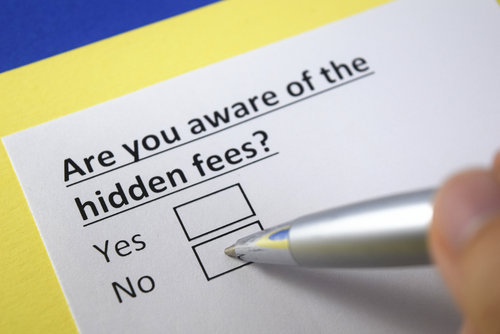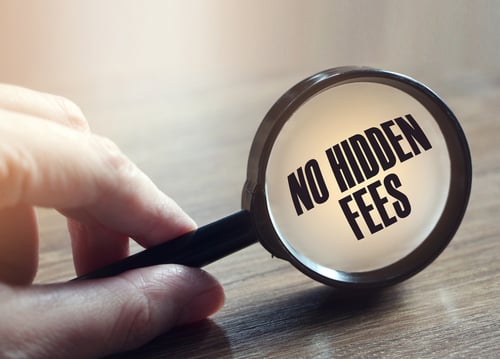Most people know what it’s like to experience an unexpected junk fee. Whether you’ve encountered undisclosed application fees, service fees, or overdraft fees, it’s never a pleasant surprise. The Biden Administration urges Congress to pass a Junk Fee Prevention Act to combat excessive junk fees. If you want to learn more about the Prevention Act and how it can help rental tenants and other consumers, just keep reading.
Contents of This Article:
- What Is a Junk Fee?
- Adverse Effects of Junk Fees on Consumers
- How Will Biden’s Prevention Act Eliminate Junk Fees?
- What the Prevention Act Means for Tenants
What Is a Junk Fee and Why Are They Bad?
Most people encounter junk fees surprisingly often. Discovering a hidden or unexpected charge not included in an item’s initial or listed price is a junk fee. For instance, you’ve probably come across application fees, processing fees, administrative fees, or other charges that aren’t immediately disclosed–these are junk fees.
Unfortunately, most consumers pay hundreds of dollars a year, or even a month, in hidden fees without even realizing it. Some of the most common types of junk fees include the following:

- Bank overdraft fees
- Late credit card payment fees
- Early termination fees
- Resort or destination fees
- Service charges tacked onto regular ticket sales
It’s pretty clear why junk fees are inherently bad, as they can be highly deceiving to regular paying consumers. For instance, if you’re paying to rent an apartment, you’re likely not expecting to pay an application fee, processing fees, non-refundable security deposits, and more.
Ultimately, hidden fees generally make high-priced housing even more unaffordable and can jeopardize access to future affordable housing arrangements. Additionally, they encourage companies to disguise the true price that consumers face. Reducing these fees can increase transparency and give consumers more peace of mind.
Whether you’re a landlord, tenant, or property management company in Washington, DC, learning about hidden fees can help increase consumer transparency. Read along to learn more about the adverse effects of junk fees on consumers.
Adverse Effects of Junk Fees on Consumers
Nobody likes to pay unexpected fees, and most people aren’t prepared to pay them when they’re presented on the spot. The adverse effects are quite clear, but here are some of the most detrimental impacts of hidden fees on American consumers.
Confusing Prices
Junk fees make it difficult for consumers to know the exact price of an item or service. Most people shop or make decisions based on advertised prices. For instance, if you’re booking a hotel for a weekend, you’d expect to pay the price listed on a travel site. However, when you go to pay, additional fees are tacked on that you wouldn’t expect. That said, even if fees are disclosed beforehand, it’s harder to compare the total costs of one service compared to another without knowing the total price.
Reduced Incentive for Competition
In a world where hidden fees are abundant, it reduces the incentive for companies to compete for customers with lower prices. After all, companies realize they can increase profits by adding junk fees. Additionally, when companies use transparency and fair pricing, it seems more expensive than rivals with lower prices but hidden fees. In turn, companies have more incentive to add more fees rather than improve the quality of their service or lower the price of their product.
Deceiving Customers
One of the most adverse effects of junk fees is deceiving unsuspecting customers. Junk fees can lure or trick customers into paying more than they intended by adding costs at the end of a purchasing process or even after a sale. For instance, if a customer decides to apply for housing, they may feel obligated to pay all the fees they’re presented with to get the rental home they want. Other times, companies may charge fees to existing customers, forcing them to pay the fee to continue using a product or service.
How Will Biden’s Prevention Act Eliminate Junk Fees?
To address the problem of junk fees, Biden encourages states to take action to eliminate them. After all, many states know the junk fees within their jurisdiction and the effects on citizens. Luckily, some states have taken action against certain fees, like hotel fees, debt settlement fees, food delivery service fees, and more.
Biden urges Congress to pass the Junk Fee Prevention Act to enforce laws prohibiting unfair and deceptive practices. Some of the main elements of the proposed plan from the White House include the following:

- Cut late credit card fees by 75%
- Offer refunds for flight cancellations and delays
- Prohibit fees for families sitting together on airlines
- Eliminate or reduce fees for switching mobile phones and internet
- Put a cap on service fees for sporting events or concerts
Although the Prevention Act hasn’t been formally enacted, the Biden-Harris Administration is working to further the agenda.
What the Prevention Act Means for Tenants
The Junk Fee Prevention Act can benefit tenants and other consumers if executed properly. After all, who couldn’t benefit from fewer hidden fees and more transparency? As such, the Biden Administration urges Congress to enforce the elimination of junk fees.
If the Prevention Act is successful, tenants will encounter fewer application and processing fees, making it easier to find affordable housing. Additionally, it’ll make it easier for prospective tenants to budget for housing costs and save more money for other necessary expenses.
If you’re looking for rental housing near Baltimore, Philadelphia, Northern Virginia, or Washington, DC, contact Bay Property Management Group. Our team of dedicated property managers can help you find a rental home that fits your budget and your needs. Additionally, if you’re a landlord looking for management help, BMG’s got your back. Contact us today to learn more about our comprehensive management services and how we can help you today.


